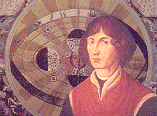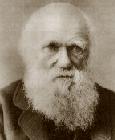History has produced many great persons in science and philosophy. Atheists are indebted to them for their courage and wonderful discoveries. Three men though, stand out as truly world changing.
They are:
Nicolaus Copernicus
Galileo Galilei
Charles Darwin
Their discoveries amid Church protest has seen religion and a god pushed further into the background. All paid a price and as atheists we should know at least a fraction about each of them and the reaction to their findings.
The following words are from the great philosopher Bertrand Russell from his book Religion and Science.
“Those to whom intellectual freedom is personally important may be a minority in the community, but among them are the men of most importance to the future. We have seen the importance of Copernicus, Galileo, and Darwin in the history of mankind, and it is not to be supposed that the future will produce no more such men. If they are prevented from doing their work and having their due effect, the human race will stagnate, and a new Dark Age will succeed, as the earlier Dark Age succeeded the brilliant period of antiquity. New truth is often uncomfortable, especially to the holders of power; nevertheless, amid the long record of cruelty and bigotry, it is the most important achievement of our intelligent but wayward species.”

Nicolaus Copernicus
Nicolaus Copernicus (1473-1543)
was born in Poland on February 19th and educated at Kracow University and the University of Bologna. His studies included mathematics, law, Greek language and medicine. It was while at Bologna he made his first recorded celestial observation, the occultation (the eclipse by the Moon) of the star Aldebaran on March 9, 1497. As the telescope had not yet been invented all of Copernicus’ findings were done by just the naked eye. The telescope was to be invented in 1609.
His interest in astronomy grew and around 1517 began writing his major work De Revolutionibus Orbium Coelestium (On the Revolutions of the Celestial Spheres). His theory was that the Earth rotates daily on its axis and revolves around the Sun yearly. Known as the heliocentric system it challenged the Ptolemaic theory that the Earth was the centre of the Universe, the geocentric system.
The work was finished in 1530 but Copernicus did not send it for publication. Finally in 1541, his pupil Rhaticus was given permission by Copernicus to take the work for publication. Unbeknownst to Copernicus the publisher Andreas Osiander who was worried about reaction from the church, wrote his own preface (but he did not say he wrote it) stating that this work is just a hypothesis.
Copernicus’ work was eventually published in 1543. It is said that he received the first copy on 24th May the day he died.
His work was put in the Index of Forbidden Books in 1611 and not taken out until around 1835. The Index was a list of books put out by the Roman Catholic Church that they considered immoral, impious or dangerous. It is hard to believe but the last edition of the list was published as recently as 1948. Luckily for Roman Catholics it was decreed in 1966 that no more new lists would be published and that it was OK to read from existing lists without fear of excommunication.
Copernicus’ original manuscript now resides in Prague.

Galileo Galilei
Galileo Galilei (1564-1642)
was born near Pisa, Tuscany on 15th February. His education was by the monks at the Vallombrosa monastery then later, around 1580 he attended the University of Pisa to study Medicine. He studied mathematics and science with the Tuscan court mathematician Ostilio Ricci then in 1585 he left the university without his degree. In 1589 he was awarded the post of mathematics lecturer at the University of Pisa. He applied for a chair of mathematics at the University of Padua in Venice in 1592, where he was accepted and stayed for a further 18 years until 1610.
In 1609 Galileo had heard that the telescope had been invented and went about building one himself. He was the first person to use the telescope in the study of astronomy. He viewed craters on the Moon, previously thought to have a smooth surface, he discovered four of Jupiter’s satellites, saw the Sun spots, Saturn’s rings and the phases of Venus. Because of the method of making his telescopes they were in high demand across all of Europe. They were the only ones able to be used for astronomical viewing in light of the way Galileo formed the lenses.
He published his findings and found himself in conflict with philosophers and professors. The idea that the earth moved around the Sun was not in accord with biblical scripture and in 1614 he was secretly denounced to the Inquisition by Dominican preachers.
Like Copernicus, Galileo’s books were included in the Index of Forbidden Books in 1616.The chief theologian was Cardinal Robert Bellarmine and he instructed Galileo to not declare or teach that the Copernican system was true but he could discuss it as a hypothetical theory.
In 1624 Galileo received permission from Pope Urban to write a book on systems of the world but only if he came to the conclusion dictated to him by the Pope. The head censor Monsignor Riccardi was to confirm these instructions in writing. In 1632 his book Dialogue on the Two Chief World Systems was published. Galileo had cleverly titled his book but there was no doubt as to where his beliefs lay. His work was a clear endorsement of the Copernican system despite the conclusion. The Pope was not amused and called him before the Inquisition to stand trial for heresy.
Galileo was tried in Rome in February 1633 and on June 16 was sentenced. On June 21 Galileo was read his sentence – guilty! He was ordered to recant and was sentenced to life imprisonment which was commuted to house arrest by the Pope. He is alleged to have said, under his breath, “But it moves for all that.” Galileo remained under house arrest for another eight years until his death on January 8 1642.
In 1998 after an investigation set up by Pope John Paul ll the Roman Catholic Church admitted it had been wrong about Galileo!

Charles Darwin
Charles Robert Darwin (1809-1882)
was born in Shrewsbury, Shropshire on February 12th. The family was wealthy, his father being a successful physician. Darwin’s grandparents were Josiah Wedgwood (famous for pottery and china) and Erasmus Darwin (poet and doctor).
Educated at Shrewsbury school he later went to Edinburgh University to study medicine. He couldn’t stand suffering or the sight of blood so the medical career was aborted. He decided to go to Cambridge University to prepare himself for the Anglican Clergy.
After graduating at age 22 he went aboard the HMS Beagle as an unpaid naturalist for a voyage around the world. The voyage went for 5 years with much time spent around South America. He collected many specimens and wrote exhaustive notes as well as a diary.
Back in England he immediately set forth reporting his findings on the Beagle voyage. In 1839 Journal of Researches was published. After years of work Darwin wrote his famous and at the time controversial book On the Origin of Species by Means of Natural Selection which was published in 1859. It basically stated that life evolves by a process of natural selection.
As with Galileo the churches and theologians attacked the findings. It conflicted with their views of special creation placing humans along side the other animals.
A famous debate took place between Thomas Henry Huxley a botanist and Darwin’s most ardent supporter (Huxley was known as “Darwin’s Bulldog”) and the Bishop of Oxford Samuel Wilberforce. Huxley an agnostic was the defender of Darwin’s theory, as Huxley was not afraid to air his view on religion. Darwin on the other hand did not want to upset the sensibilities of his very religious wife.
Darwin went on to write other works continuing on from his Origin of Species. One was The Descent of Man and Selection in Relation to Sex. Although it is often assumed that humans were mentioned in On the Origin of Species it was not so. Other books mainly botanical in nature were later written.
Charles Robert Darwin died at his home of a heart attack on April 19. He was 73 years old. After a petition from Parliamentarians Darwin was buried in Westminster Abbey. Thomas Huxley was one of the pallbearers at his funeral.
“I am a strong advocate for free thought on all subjects, yet it appears to me (whether rightly or wrongly) that direct arguments against Christianity and theism produce hardly any effect on the public; and freedom of thought is best promoted by the gradual illumination of men’s minds, which follow(s) from the advance of science. It has, therefore, been always my object to avoid writing on religion, and I have confined myself to science. I may, however, have been unduly biased by the pain which it would give some members of my family, if I aided in any way direct attacks on religion.” Darwin
Bibliography
Purnell’s Encyclopedia
Encyclopaedia Britannica
A History of Western Philosophy – Bertrand Russell
Why I am not a Christian – Bertrand Russell
Scientists BluPete
By Lee Holmes
